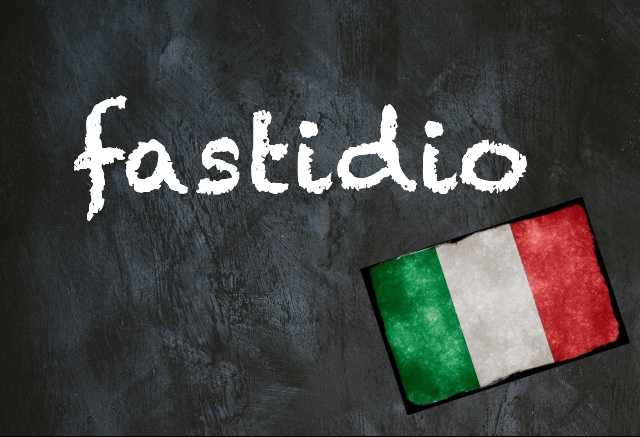Italian word of the day: 'Fastidio'

This word might be annoyingly easy to mistranslate.
If you ever hear someone described as fastidioso in Italian, it doesn't mean they're highly concerned about accuracy and detail. Though the word has the same Latin root as the English 'fastidious', in Italian instead it means annoying or bothersome.
Mio fratellino è molto fastidioso.
My little brother is very annoying.
È estremamente fastidioso che l'autobus sia sempre in ritardo di almeno 30 minuti.
It's extremely annoying that the bus is always at least 30 minutes late.
The adjective comes from the noun fastidio (click here to hear in pronounced), meaning bother, hassle, annoyance, discomfort, or inconvenience; which in turn comes from the Latin fastidium, meaning loathing or disgust.
Fastidium is thought to be a crossover of fastus, meaning something like pride or disdain, and taedium, meaning tedium; so you can see how we got both the modern Italian sense of 'annoying' and the modern English sense of 'overly concerned with detail' from the original.
The noun fastidio is generally used in combination with the verb dare ('to give'), to talk about 'giving someone' trouble or annoyance by bothering them or putting them out; one of the most common uses is to ask someone whether they 'mind' something.
Ti da fastidio se lasciamo i bagagli qua per qualche ora?
Do you mind if we leave our bags here for a few hours?
- Luca, vieni da me e lascia la signora in pace.
- Tranquilla, non mi da fastidio.
Another way to talk about getting annoyed is via the related verb infastidire.
As with the Italian verb annoiarsi (to get/be bored; literally: 'bore oneself'), you can infastidirsi ('get annoyed'; literally: annoy oneself), or something specific can be the source of your irritation:
Mi infastidisco quando leggo cose del genere sui giornali.
I get annoyed when I read things like that in the news.
Perché ultimamente ti infastidisco?
Why are you getting annoyed with me lately? (literally, "why am I annoying you lately?")
Si infastidisce ogni volta che cerco di parlarne.
She gets annoyed every time I try to bring it up.
That's enough bother for one day: see if you can get fastidio into a conversation this week without putting yourself out too much.
Do you have a favourite Italian word you’d like us to feature? If so, please email us with your suggestion.
Comments
See Also
If you ever hear someone described as fastidioso in Italian, it doesn't mean they're highly concerned about accuracy and detail. Though the word has the same Latin root as the English 'fastidious', in Italian instead it means annoying or bothersome.
Mio fratellino è molto fastidioso.
My little brother is very annoying.
È estremamente fastidioso che l'autobus sia sempre in ritardo di almeno 30 minuti.
It's extremely annoying that the bus is always at least 30 minutes late.
The adjective comes from the noun fastidio (click here to hear in pronounced), meaning bother, hassle, annoyance, discomfort, or inconvenience; which in turn comes from the Latin fastidium, meaning loathing or disgust.
Fastidium is thought to be a crossover of fastus, meaning something like pride or disdain, and taedium, meaning tedium; so you can see how we got both the modern Italian sense of 'annoying' and the modern English sense of 'overly concerned with detail' from the original.
The noun fastidio is generally used in combination with the verb dare ('to give'), to talk about 'giving someone' trouble or annoyance by bothering them or putting them out; one of the most common uses is to ask someone whether they 'mind' something.
Ti da fastidio se lasciamo i bagagli qua per qualche ora?
Do you mind if we leave our bags here for a few hours?
- Luca, vieni da me e lascia la signora in pace.
- Tranquilla, non mi da fastidio.
Another way to talk about getting annoyed is via the related verb infastidire.
As with the Italian verb annoiarsi (to get/be bored; literally: 'bore oneself'), you can infastidirsi ('get annoyed'; literally: annoy oneself), or something specific can be the source of your irritation:
Mi infastidisco quando leggo cose del genere sui giornali.
I get annoyed when I read things like that in the news.
Perché ultimamente ti infastidisco?
Why are you getting annoyed with me lately? (literally, "why am I annoying you lately?")
Si infastidisce ogni volta che cerco di parlarne.
She gets annoyed every time I try to bring it up.
That's enough bother for one day: see if you can get fastidio into a conversation this week without putting yourself out too much.
Do you have a favourite Italian word you’d like us to feature? If so, please email us with your suggestion.

Join the conversation in our comments section below. Share your own views and experience and if you have a question or suggestion for our journalists then email us at [email protected].
Please keep comments civil, constructive and on topic – and make sure to read our terms of use before getting involved.
Please log in here to leave a comment.